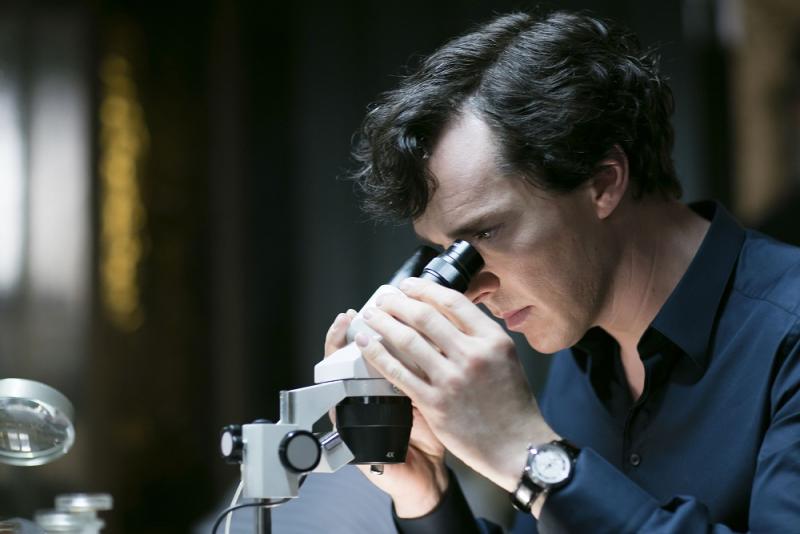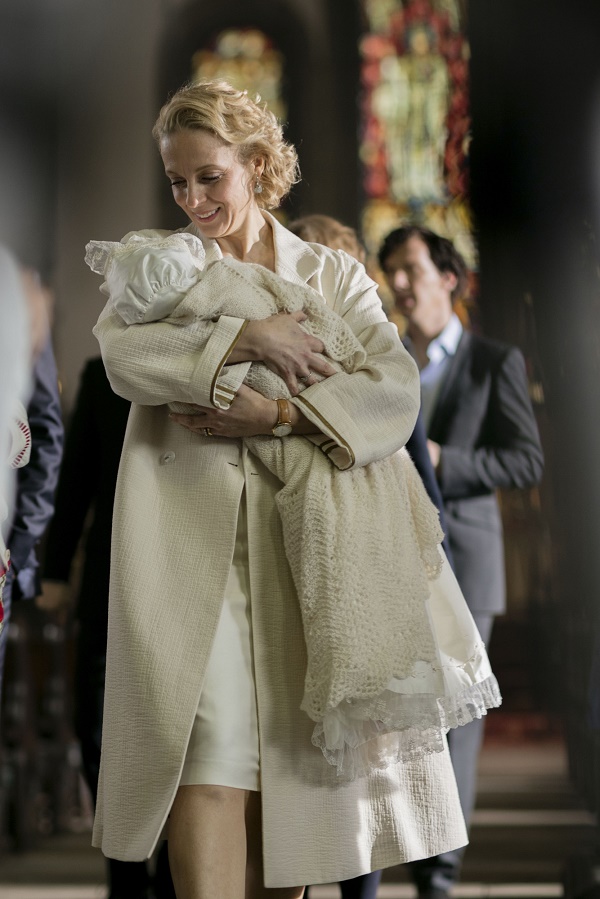Sherlock, Series 4, BBC One | reviews, news & interviews
Sherlock, Series 4, BBC One
Sherlock, Series 4, BBC One
Welcome back: Cumberbatch and co return from the past in 'The Six Thatchers' (warning, contains spoilers)

Sherlock’s back in the here and now, and not before time. Twelve months ago, Benedict Cumberbatch’s Holmes laid down his mobile phone to return to Edwardian London for a plate-spinning deer-stalking mind-warping one-off. The Abominable Bride, though good in parts, caused a mass outbreak of head-scratching.
It now looks as if they thought so too. The fourth series began with a story that, by Sherlockian standards, played a unusually straight bat. It began at the beginning – the death of a Tory MP’s son – and took a relatively untortuous path to a clear end and another much more significant death. And flirted along the way with gung-ho ordnance-enriched action sequences.
Let’s leave it to Conan Doyle scholars to tick off the overlap between The Six Thatchers and its source material, The Adventure of the Six Napoleons. The little Frenchman was name-checked as a figure from the history to which Britain’s first female PM has now also been consigned, but mainly Mrs T’s role was tantamount to a red herring. A series of little busts of her kept getting smashed up and down the land. The trail led to Tbilisi where, six years earlier, an attempt to rescue the kidnapped UK ambassador was foiled with disastrous long-term consequences.
 Mark Gatiss, who wrote the script, took it as a springboard to explore the murky past of John Watson’s enigmatic missus. Mary’s former career as part of a crack quartet of armed freelance operatives was revealed just as she began warming to the task of late motherhood (the baby girl, with a sense of drama to match that of her new godfather, arrived in the car on the way to hospital). The episode gave Amanda Abbington (pictured) a belated chance to stretch her legs, steal scenes and muck about with toys and wigs, and she grabbed at it as if coming up for air.
Mark Gatiss, who wrote the script, took it as a springboard to explore the murky past of John Watson’s enigmatic missus. Mary’s former career as part of a crack quartet of armed freelance operatives was revealed just as she began warming to the task of late motherhood (the baby girl, with a sense of drama to match that of her new godfather, arrived in the car on the way to hospital). The episode gave Amanda Abbington (pictured) a belated chance to stretch her legs, steal scenes and muck about with toys and wigs, and she grabbed at it as if coming up for air.
As a third wheel who upset the detective-sidekick dynamic, from the start Mary was a curious and not always popular addition to the Holmes narrative. In this episode John (Martin Freeman) was even able to cede his place in Baker Street opposite Sherlock to a balloon with a smiley face on it without being missed. Well, there’s no need to worry about her getting in the way any more.
If there was an intensely gloomy ending to The Six Thatchers, most of what preceded it was a familiar firework display of witty riffs and beguiling tricks. Gatiss’s narrative rhythm, abetted by director Rachel Talalay and Cumberbatch's ability to speak polysyllabic paragraphs at warp speed, is an amphetamine-powered quickstep, very occasionally interleaved by pit-stop scenes in which everyone is allowed to breathe a bit. Sherlock never gets less motor-mouthed, but more and more he plays on his reputation for matchless deductive reasoning by just making stuff up – about the mathematics of possibility, say, or Moriarty destabilising the US presidency (hah!).
Another of the pleasures of this new series is its comparative modesty. Since the third series two years ago, subscription channels have established new norms for appointment-to-view TV drama. If Sherlock were made by Netflix they’d hurl so many dollars at production design that you wouldn’t be able to hear the bangs for the whistles. The BBC's terrestrial version places most of its eggs in the baskets marked dialogue, plot and ironic running commentary. Hence the delightful scene in the London Aquarium in which Marcia Warren’s piffling secretary was exposed as an unlikely double agent. Never mind the outrageous implausibilities, nor things like Sherlock’s slightly naff pool fisticuffs with Sacha Dhawan’s rogue nemesis. Sherlock is content to look and behave like great television rather than television that thinks it’s on a 30-foot screen.
The bum note was John’s bus flirtation that felt like an awkward offcut from Fleabag. What he needs saving from is the sidelines. Knackered dads flirting by text and other tawdry reminders of the everyday really don’t belong in the parallel hyper-reality of Sherlock. Unless there’s a twist, of course. There usually is.
rating
Explore topics
Share this article
Add comment
The future of Arts Journalism
You can stop theartsdesk.com closing!
We urgently need financing to survive. Our fundraising drive has thus far raised £33,000 but we need to reach £100,000 or we will be forced to close. Please contribute here: https://gofund.me/c3f6033d
And if you can forward this information to anyone who might assist, we’d be grateful.

Subscribe to theartsdesk.com
Thank you for continuing to read our work on theartsdesk.com. For unlimited access to every article in its entirety, including our archive of more than 15,000 pieces, we're asking for £5 per month or £40 per year. We feel it's a very good deal, and hope you do too.
To take a subscription now simply click here.
And if you're looking for that extra gift for a friend or family member, why not treat them to a theartsdesk.com gift subscription?
more TV
 The Trunk, Netflix review - stylish, noir-ish Korean drama wrapped around a beguiling love story
Unusual psychological study of a stranger paid to save a toxic marriage
The Trunk, Netflix review - stylish, noir-ish Korean drama wrapped around a beguiling love story
Unusual psychological study of a stranger paid to save a toxic marriage
 Malpractice, ITV1, Series 2 review - fear and loathing in the psychiatric unit
Powerful return of Grace Ofori-Attah's scathing medical drama
Malpractice, ITV1, Series 2 review - fear and loathing in the psychiatric unit
Powerful return of Grace Ofori-Attah's scathing medical drama
 Fake, ITV1 review - be careful what you wish for
Australian drama probes the terrors of middle-aged matchmaking
Fake, ITV1 review - be careful what you wish for
Australian drama probes the terrors of middle-aged matchmaking
 Formula E: Driver, Prime Video review - inside the world's first zero-carbon sport
F1's electric baby brother get its own documentary series
Formula E: Driver, Prime Video review - inside the world's first zero-carbon sport
F1's electric baby brother get its own documentary series
 Flintoff, Disney+ review - tumultuous life and times of the great all-rounder
John Dower's documentary is gritty, gruelling and uplifting
Flintoff, Disney+ review - tumultuous life and times of the great all-rounder
John Dower's documentary is gritty, gruelling and uplifting
 Your Friends & Neighbors, Apple TV+ review - in every dream home a heartache
Jon Hamm finds his best role since 'Mad Men'
Your Friends & Neighbors, Apple TV+ review - in every dream home a heartache
Jon Hamm finds his best role since 'Mad Men'
 MobLand, Paramount+ review - more guns, goons and gangsters from Guy Ritchie
High-powered cast impersonates the larcenous Harrigan dynasty
MobLand, Paramount+ review - more guns, goons and gangsters from Guy Ritchie
High-powered cast impersonates the larcenous Harrigan dynasty
 This City is Ours, BBC One review - civil war rocks family cocaine racket
Terrific cast powers Stephen Butchard's Liverpool drug-ring saga
This City is Ours, BBC One review - civil war rocks family cocaine racket
Terrific cast powers Stephen Butchard's Liverpool drug-ring saga
 The Potato Lab, Netflix review - a K-drama with heart and wit
Love among Korean potato-researchers is surprisingly funny and ideal for Janeites
The Potato Lab, Netflix review - a K-drama with heart and wit
Love among Korean potato-researchers is surprisingly funny and ideal for Janeites
 Adolescence, Netflix review - Stephen Graham battles the phantom menace of the internet
How antisocial networks lead to real-life tragedy
Adolescence, Netflix review - Stephen Graham battles the phantom menace of the internet
How antisocial networks lead to real-life tragedy
 Drive to Survive, Season 7, Netflix review - speed, scandal and skulduggery in the pitlane
The F1 documentary series is back on the pace
Drive to Survive, Season 7, Netflix review - speed, scandal and skulduggery in the pitlane
The F1 documentary series is back on the pace
 A Cruel Love: The Ruth Ellis Story, ITV1 review - powerful dramatisation of the 1955 case that shocked the public
Lucy Boynton excels as the last woman to be executed in Britain
A Cruel Love: The Ruth Ellis Story, ITV1 review - powerful dramatisation of the 1955 case that shocked the public
Lucy Boynton excels as the last woman to be executed in Britain

Comments
So many 'bum notes' that it
Oh Jasper, you have been kind